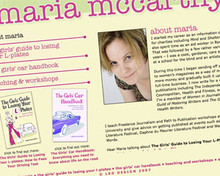
Do I send my manuscript to one agent at a time or do a group mail-out?
This is a tricky issue, and not one with a clear solution. Many agents don't like the idea that you might be approaching others at the same time, but bearing in mind how long it can take to get a response from an agent (up to six weeks) the whole process can end up being dragged out for ages.
The agents won't necessarily know you've sent your work to others - unless you tell them, or they happen to hear via gossip - so really, it's up to you what approach you take.
What if I get rejected?
Rejections come in two varieties: standard - just a photocopied, 'many thanks but our list is full' letter; or personal - where the agent has taken time to give you feedback on your work.
The latter are far more encouraging, as they wouldn't bother if they didn't think you weren't roughly on the right track.
How should I approach and deal with publishers direct?
If, for whatever reason, the agent route isn't right for you then it's worth approaching publishers direct using the 'first three chapters, synopsis, selling outline and covering letter' formula outlined in part one.
If they offer you a deal, it may be possible to get an agent after the event. Alternatively it's worth joining the Society of Authors - they'll accept you if you have a contract and often will allow you to join on the basis of considerable journalism experience. They examine members' contracts and give advice free of charge.
And the most important question – will I be able to give up the day job?
Probably not, unfortunately. The usual practice for authors is to be paid an advance and then royalties on top if the book sells well.
To give an example, if Jane Jones sells her book 'Caring for your Gerbil' for a £9,000 advance, she will get a percentage of the cover price as royalties - approximately 50p per copy for the average paperback. Once it has sold 18,000 copies, the advance is said to be 'earned out' and the extra 50ps go to her.
However, if it only sells 2,000 copies, Jane will still get to keep the £9,000 - you don't have to give unearned advances back. An advance is usually paid in three chunks: one on signing the contract, one on delivery of the manuscript and one on publication - so Jane would get £3,000 each time.
Some advances are modest, but go on to make huge sums in royalties. For example, the first Harry Potter book sold for £2,000 advance, but has gone on to make millions in royalties. However some books get paid high advances that never get earned out - David Blunkett's and Greg Dyke's memoirs both fall into this category.
Large advances tend, on the whole to go to high-profile politicians and celebrities, who publishers believe can generate the publicity needed for high sales - though sometimes less glitzy authors can get them too, especially if it's thought the book might have some special appeal or is capable of bagging one of the big literary prizes.
On average, first advances tend to be in the £2,000-£15,000 range, but with potential for foreign rights on top of that if it has overseas appeal.
Some publishers offer just a flat fee, without royalties - maybe as low as £1,000 for as many as 20,000 words. Only you can decide if this sort of figure is worth your while.
So is it going to be worth my while?
That's a question only you can answer. As the author John Steinbeck once said, "Publishing makes horse-racing look like a nice, stable occupation."
The financial rewards of writing a book vary wildly, but even if you don't make much cash out of it, there are other benefits to be considered. Being an author can mean you're taken more seriously in your professional field and opens up other opportunities, such as teaching.
It also means that you've moved on from being one of those journalists who only talks about writing a book to one of the rare few who's actually done it.
Good luck!
This is part two of Maria's guide. Part one can be read here. Maria McCarthy is author of The Girls' Guide to Losing Your L Plates and The Girls' Car Handbook published by Simon and Schuster and teaches Path to Publication workshops at Bristol University. For useful writing links check out her website at www.mariamccarthy.co.uk
Free daily newsletter
If you like our news and feature articles, you can sign up to receive our free daily (Mon-Fri) email newsletter (mobile friendly).









